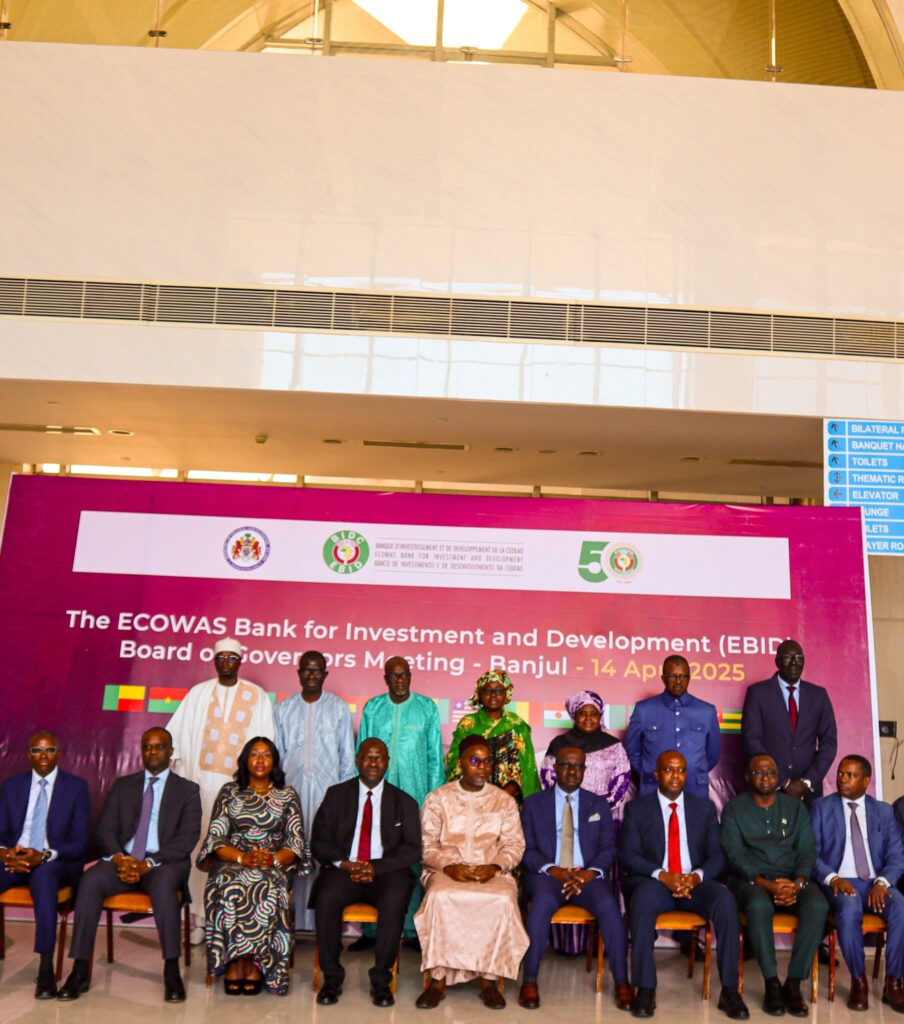ECOWAS Bank Board of Governors Meets in Banjul for 23rd Ordinary Session

Group Photo Of The Stakeholders At The Conference Center
By Ramatoulie Jawo
The Board of Governors of the ECOWAS Bank for Investment and Development (EBID), composed of Ministers of Finance and Economic Planning from member states, has convened in Banjul for its 23rd Ordinary Session. The high-level meeting is taking place at the Sir Dawda Kairaba Jawara International Conference Center in Bijilo.
This annual session, which serves as the Bank’s highest decision-making body, provides a platform to review EBID’s performance and define its strategic priorities. The Board oversees critical areas such as capital allocation, leadership appointments, and the long-term direction of the institution.
Representing President Adama Barrow at the opening, Vice President Muhammed B.S. Jallow emphasized the importance of The Gambia’s recovery-focused National Development Plan, describing it as a transformative blueprint for national development. He reaffirmed The Gambia’s readiness to leverage EBID’s financing instruments to unlock opportunities for poverty reduction, wealth creation, and job generation, thereby improving lives across the ECOWAS region.
He further highlighted the government’s commitment to deepening collaboration with EBID in addressing common challenges, including unemployment, poverty, climate change, and social injustice.
Outgoing Chairman of the EBID Board and Gambia’s Minister of Finance and Economic Affairs, Hon. Seedy Keita, commended the Bank’s resilience in 2024 despite global and regional challenges. He reported that EBID’s cumulative commitments rose by 11.68%, reaching UA 2.8 billion (USD 3.7 billion) across 194 operations. Interest income increased by 12.5%, while profits grew by 12.9%, amounting to UA 6.43 million (approximately USD 8.55 million).
“The bank’s balance sheet expanded by 5.6% to UA 1,479.6 million and USD 1,967.09 million, reflecting its capacity to maintain profitability and scale up operations, even amid regional inflation averaging 20.0%. These figures underscore EBID’s crucial role in fostering economic development and resilience within the ECOWAS region,” he said.
Hon. Keita noted that ECOWAS’s economic growth is projected at 4.1% in 2024—up from 3.8% in 2023—driven by price stability and increased activity in agriculture and services. He also reported that inflation eased slightly to an average of 20.0% in 2024 from 20.6% in the previous year, attributing the decline to falling food prices and fiscal consolidation, particularly within the WAEMU zone.
On debt sustainability, he noted a projected decrease in ECOWAS’s debt-to-GDP ratio to 53.1% in 2024 from 54.0% in 2023, supported by improved external balances and disciplined fiscal management.
“The debt-to-GDP ratio for ECOWAS was projected to decline modestly to 53.1% in 2024 from approximately 54.0% in 2023, supported by improved external balances and fiscal discipline, though debt sustainability remains a concern for several member states,” he said.
He urged fellow governors to engage in open and constructive dialogue, stating that the decisions and strategies adopted during this session would significantly impact the future trajectory of the region.
Dr. George Agyekum Donkor, President of EBID, outlined both the achievements and obstacles encountered on the Bank’s journey. He cited economic volatility, geopolitical tensions, and global health crises as major challenges, but praised the Board’s commitment for ensuring the Bank’s operational continuity and growth.
Dr. Donkor raised concerns about the potential impact of non-payment of capital contributions by the end of December 2025, warning that it could lead to a downgrade of the Bank’s credit rating—subsequently increasing the cost of capital and negatively affecting operations.
He also addressed the political situation regarding the possible withdrawal of Burkina Faso, Mali, and Niger from ECOWAS. He warned that a hard exit by these countries—whose combined portfolio with the Bank amounts to UA 252.15 million (20.42% of EBID’s portfolio)—could significantly affect the institution, despite Burkina Faso and Mali having met recent public sector payment obligations.
Speaking on behalf of the incoming chairman, Ghana’s Minister of Finance Hon. Thomas Nyarko Ameen pledged to continue building on the solid foundation laid by his predecessors. He promised close collaboration with fellow governors and stakeholders to ensure EBID’s continued success.“In line with this commitment I am dedicated to advancing the bank’s progress in four strategic areas, enhancing resource mobilization, improving capital recovery efforts facilitating the onboarding of non regional members to elevate our institutional profile and positioning EBID as the leading development finance institution in west Africa,” he said.

